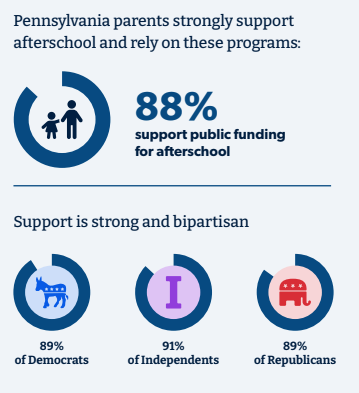Pennsylvania will benefit from OST programs and increased funding.
Many children and teens in Pennsylvania are missing out on the valuable experiences and support that out-of-school time (OST) programs provide. Families report that high costs, lack of transportation, and limited access are significant barriers to enrolling their children in these programs.
To tackle these issues, we need to increase access to OST programs across Pennsylvania. The Joint State Government Commission has recommended creating a dedicated funding source for OST programs, stressing that these investments must be prioritized and sustained for the long term.
Without these efforts, more than 775,000 children in Pennsylvania who would enroll in an OST program are left without access to one. This number underscores the pressing need to expand these programs to reach more families. By removing barriers to OST program enrollment, Pennsylvania can help ensure more children receive the additional support and learning opportunities they need to thrive.
The Case for Investing in Out of School Time
Afterschool, summer learning, and other out-of-school time (OST) programs are crucial to our education system. They provide Pennsylvania families with essential support, helping to keep kids safe, engage young people in enriching activities, and allow working parents to maintain their jobs. Despite this, Pennsylvania has never had enough programs to meet the demand from families who need them.
The Pennsylvania Statewide Afterschool/Youth Development Network is collaborating with a wide range of stakeholders to strengthen partnerships between schools, communities, and OST providers. Their goal is to build a robust system of support that will benefit current and future generations of Pennsylvanians.
Building Workforce Skills
Out-of-school time (OST) programs offer students, from elementary to high school, unique opportunities to acquire workforce skills and explore potential career paths. Here's how these programs contribute to their development:
Foundational Skills: OST programs help young people build essential skills such as teamwork, communication, and critical thinking. These are crucial in preparing them for future jobs.
Career Exploration: Through these programs, students are introduced to new interests and mentors, which can inspire them to consider various career pathways. This exposure can be instrumental in shaping their future choices.
Real-World Experience: OST programs offer opportunities for students to gain practical work experience. This might include volunteering, apprenticeships, or internships, allowing them to apply what they learn in a real-world context.
Leadership Development: These programs give young people the chance to find their voice, take ownership of projects, and assume leadership roles. This encourages them to develop confidence and a sense of responsibility.
Accelerated Learning and Growth
Students who consistently engage in high-quality out-of-school time (OST) programs experience notable benefits that foster both academic and personal growth. Here's how these programs contribute to a student's success:
Stronger Social Skills: OST programs provide environments where students can interact with peers, build relationships, and improve their social skills. This interaction fosters better communication and teamwork.
Excitement for Learning: By offering engaging and varied activities, OST programs ignite a passion for learning in students. This excitement can translate into improved motivation in school.
Better Work Habits and Grades: Students in OST programs often develop disciplined work habits, which can lead to improved academic performance. The support and structure these programs provide contribute to better focus and productivity.
Improved School Attendance: Participation in OST programs can lead to more consistent school attendance. Students who enjoy their after-school experiences are more likely to stay engaged and attend school regularly.
Higher Graduation Rates: Ultimately, students who participate in OST programs tend to have higher graduation rates. The skills and support gained from these programs set a solid foundation for academic success and long-term achievement.
Research provided by Pennsylvania statewide afterschool youth development network. Click here for full report.


